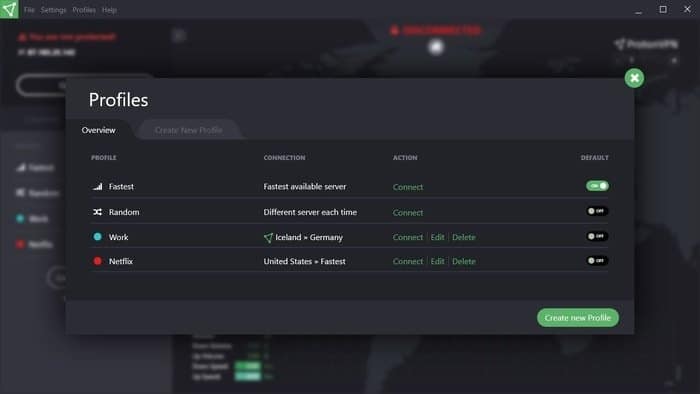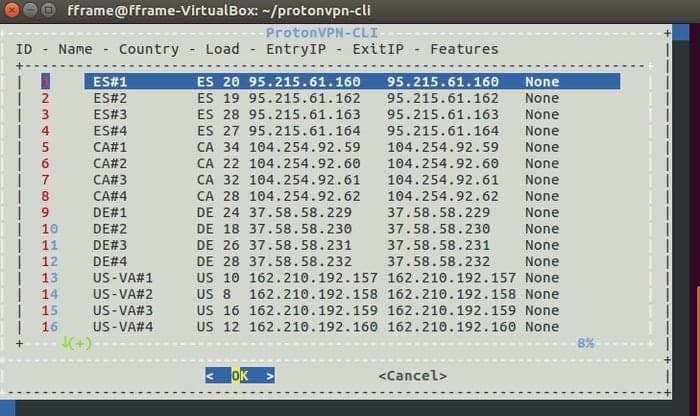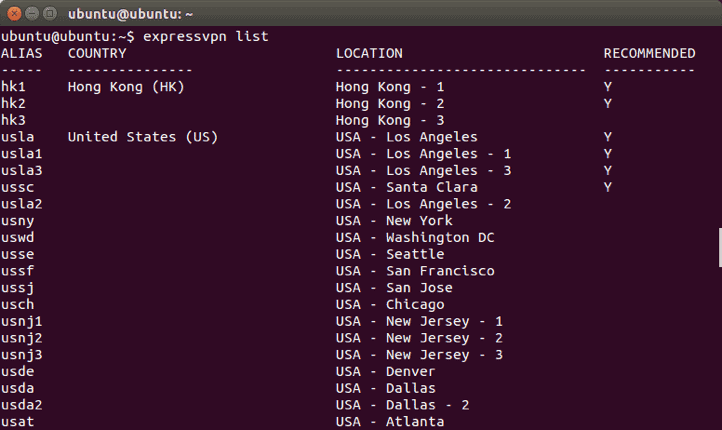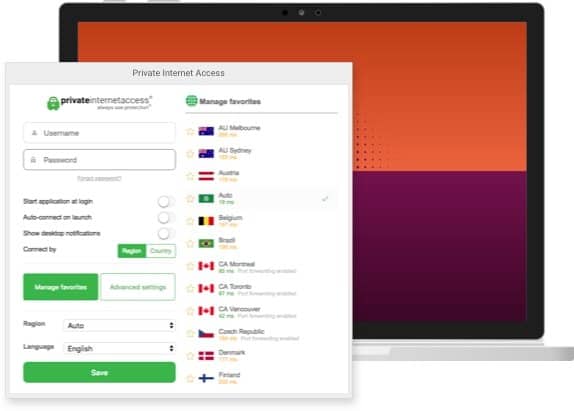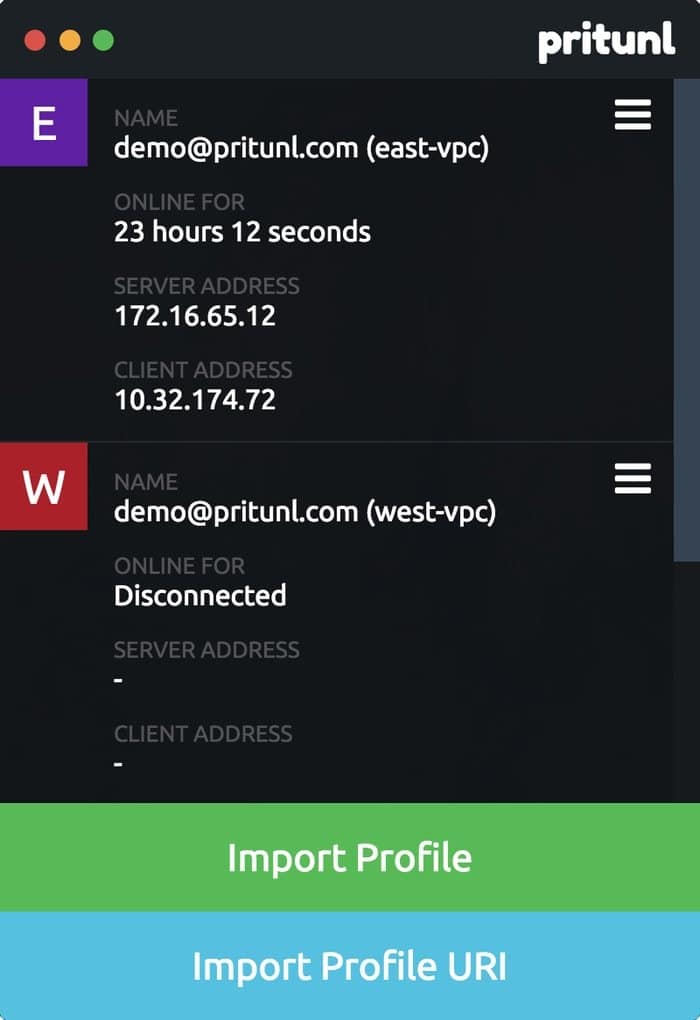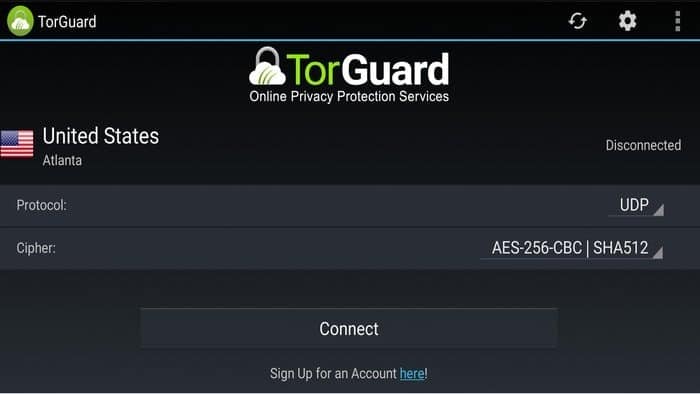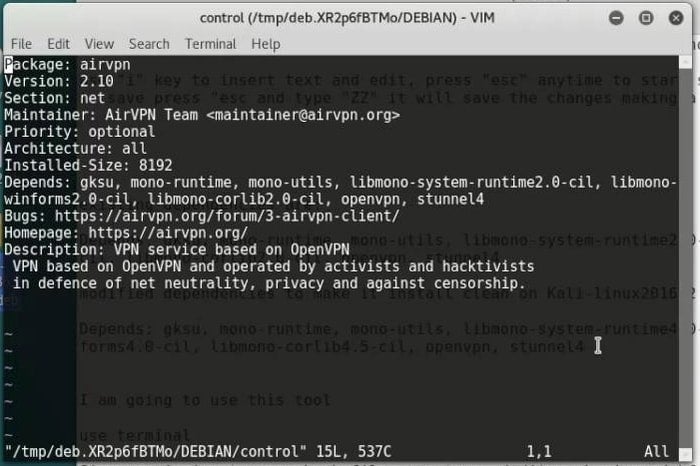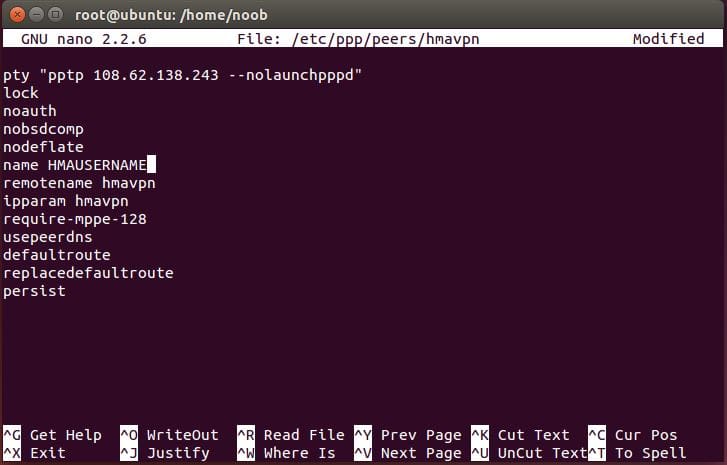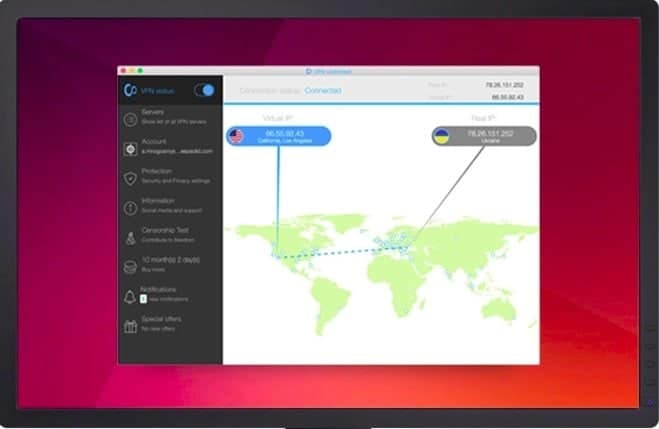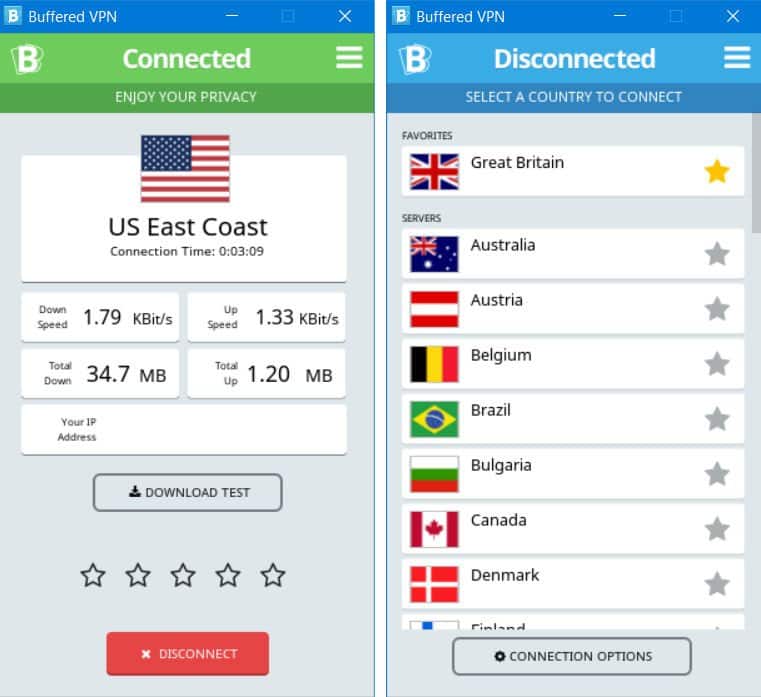- VPN Client software implementations
- OpenVPN with GUI for Mac OS X
- OpenVPN with GUI for Win
- References
- 10 Best Linux VPN Clients and Services
- Best Linux VPN Client Software and Services
- 1. ProtonVPN Client Tool for Linux
- 2. ExpressVPN – All Round VPN for Linux
- 3. Private Internet Access
- 4. Pritunl Client – Open Source OpenVPN Client
- 5. TorGuard – Privacy with Anonymous VPN
- 6. AirVPN – Best VPN for Security and Privacy
- 7. HideMyAss – Best VPN for Novice Users
- 8. Mullvad – Privacy is a Universal Right
- 9. VPN Unlimited – Top-Notch Protection
- 10. Buffered VPN – Private, Safe, and Fair
- What Makes a Good Linux VPN?
- Final Thought
VPN Client software implementations
Many Linux distributions including Ubuntu desktop variants come with Network Manager, a nice GUI to configure your network settings. It also can manage your VPN connections. It is the default, but if in doubt make sure you have package network-manager-openvpn installed.
Open the Network Manager GUI, select the VPN tab and then the ‘Add’ button. Select OpenVPN as the VPN type in the opening requester and press ‘Create’. In the next window add the OpenVPN’s server name as the ‘Gateway’, set ‘Type’ to ‘Certificates (TLS)’, point ‘User Certificate’ to your user certificate, ‘CA Certificate’ to your CA certificate and ‘Private Key’ to your private key file. Use the advanced button to enable compression (e.g. comp-lzo), dev tap, or other special settings you set on the server. Now try to establish your VPN.
OpenVPN with GUI for Mac OS X
- Tunnelblick is an excellent free, open source implementation of a GUI for OpenVPN for OS X. Download the latest OS X installer from there and install it. It also is recommended by upstream which would have a alternative on their own
Then put your client.ovpn config file together with the certificates and keys in /Users/username/Library/Application Support/Tunnelblick/Configurations/ and lauch Tunnelblick from your Application folder.
Instead of downloading manually, if you have brew set up on MacOS this is as easy as:
brew cask install tunnelblick
OpenVPN with GUI for Win
First download and install the latest OpenVPN Windows Installer. As of this writing, the management GUI is included with the Windows binary installer.
You need to start the OpenVPN service. Goto Start > Computer > Manage > Services and Applications > Services. Find the OpenVPN service and start it. Set it’s startup type to automatic.
When you start the OpenVPN MI GUI the first time you need to run it as an administrator. You have to right click on it and you will see that option.
There is an updated guide by the upstream project for the client on Windows.
References
10 Best Linux VPN Clients and Services
Do you want to secure your online privacy? If yes, then you have come to the right place. Despite the trademark as Linux is the safest and most secure OS, online surfing and life are not as safe as you think. There are lots of unwanted intrusions ready to make your digital life imbalanced.
Here you must learn how to combat various intrusions and malicious threats. Securing online privacy is one concerning a topic in today’s technology world. So being a Linux user or any other OS hobbyist, you must secure your online identity, privacy, and footprints.
In this case, VPN services with a Linux VPN Client come into the picture to ensure your anonymity and online security.
Some popular Linux VPN client software is available in the community to connect a VPN server, like OpenVPN, AnyConnect, Network Manage, and OpenConnect. But it would be better if the VPN services provide a native Linux VPN client that makes a plug-and-play mode with minimum manual configuration.
Best Linux VPN Client Software and Services
This roundup article will share a generic list of the best Linux VPN clients and some best VPN services. This will help privacy-minded users add an extra layer of protection and security to keep the internet connection private. Moreover, you can also have the facility of unblocking content or bypass censorship.
1. ProtonVPN Client Tool for Linux
ProtonVPN is created by a group of scientists, engineers, and cryptographers to secure the internet for everyone and anywhere you access the internet. This VPN service is focused on privacy, security, and freedom. It creates an encrypted VPN tunnel where your personal passwords and banking data remain safe even when using a public or untrusted data connection.
It keeps your browsing data private and does not share it with any third party. It also lets you have access to geo-locked content or any website. The Tor anonymity network is smoothly integrated with ProtonVPN so that you can get all the traffic through it.
2. ExpressVPN – All Round VPN for Linux
ExpressVPN is one of the best VPNs for Linux, and it supports a wide range of Linux distros, including Ubuntu, Debian, CentOS, Fedora, etc. This VPN service provides impressive Linux support and speedy performance.
Though ExpressVPN does not offer any desktop GUI, you have a command-line interface that might be difficult for newbie Linux users. You can use OpenVPN to configure this Linux VPN service, and it doesn’t record any online activity or logging of traffic information.
3. Private Internet Access
Private Internet Access (PIA) is a well-known VPN service with a 256-bit AES encrypted connection to provide you with an anonymous IP to protect your online footprints and privacy. Besides all other protocols, OpenVPN is the default and most secure one.
This Linux VPN service provides a kill switch, IPV6, and DNS leak protection. It does not keep any traffic or user activity logs on the VPN server.
4. Pritunl Client – Open Source OpenVPN Client
Pritunl is a free, minimalist, and open source cross-platform OpenVPN client. This Linux VPN Client lets you connect with OpenVPN servers in the fastest way. Moreover, you can also import OpenVPN profiles and do a little bit of configuration with the existing connection.
Pritunl client is simple, easy to use, and offers a modern colorful UI. You can import OpenVPN profiles as many as you want. You can find easy documentation on installing Pritunl OpenVPN clients on various Linux distros on the official site.
5. TorGuard – Privacy with Anonymous VPN
TorGuard Linux VPN service is best known for the perfect balance of price and performance. This best VPN for Linux provides a military-grade encrypted internet connection for your digital footprint and stays as long as you want with speed and performance using anonymous IP. This VPN service provides a native Linux VPN client with a nifty how-to guide for easy configuration.
TorGuard is relentlessly concerned and committed to online security and privacy protection. The service includes multiple protocol support, AnyConnect, OpenConnect SSL support, Perfect Forward Secrecy (TLS), unwanted ads, malware, and intrusion blocking. This Linux VPN server does not store any logging or traffic logs in the VPN server and protection from deep packet inspection.
6. AirVPN – Best VPN for Security and Privacy
AirVPN is a reliable, highly customizable, and privacy-focused best VPN for Linux. It has a native Linux VPN client for all the major distributions. You can either use a command line or GUI for easy configuration. This is an OpenVPN-based Linux VPN server that ensures a solid and encrypted defense tunnel for privacy and net neutrality.
This military-grade encryption tunnel prevents unwanted intrusions like spying on ISP, the government, or any criminal organization. This best VPN service is transparent enough on online security and privacy fronts. This offers tools like a kill switch, an internal DNS solution, and support for OpenVPN over SSH, SSL, or Tor.
7. HideMyAss – Best VPN for Novice Users
HMA is a good choice for novice users to easily and configurable native Linux VPN clients or even OpenVPN. This VPN service provides a well-written how-to guide for Linux.
It’s a cross-platform and multi-device supported VPN service. You can enjoy unlimited uploads and downloads, fast and ultra-reliable network access, secure public Wi‑Fi, and Watch anything anywhere.
8. Mullvad – Privacy is a Universal Right
Mullvad provides an open source VPN client for Ubuntu/Debian based on a graphical user interface. Mullvad is one of the best VPN services with lots of features like IPv6 routing, a kill switch, perfect port forwarding, IPv6 and DNS leak protection, etc. All those tools are just for your online identity, location, and activity to be private.
This VPN service creates a strong AES-256 encrypted connection to browse the web securely and protect your privacy. Mullvad’s Linux VPN server does not store any activity logs and keeps you as anonymous as you want in your digital life.
9. VPN Unlimited – Top-Notch Protection
VPN Unlimited is quite well known across all the major OS platforms,s including Linux, Windows, Android, macOS, iOS, etc. It supports OpenVPN protocol, stops tracking, ad blocking, and anti-malware.
This Linux VPN service does not share data, personal passwords, or bank data with any third party. VPN Unlimited encrypts the data connection and ensures total security with uncompromised speed.
10. Buffered VPN – Private, Safe, and Fair
If you want to protect yourself from unwanted online intrusion or spyware, then a Buffered VPN is for you. It has been rated and voted one of the best and fastest VPN services in the Linux community.
It’s easy to set up on Linux but only supports OpenVPN protocol. Buffered VPN is compatible across devices and ensures a high-speed connection with no restrictions . It has a very simple and modern Linux VPN client. Check out the official tutorial on installing in Ubuntu.
What Makes a Good Linux VPN?
Here I’ve tried to enlist all the best VPN services for Linux based on support as native Linux VPN clients and a clear and transparent privacy policy that spells everything out.
So while selecting the best VPN for Linux, you must look forward to some criteria like a Linux VPN client is available with little or no manual configuration, ensures a speedy performance, does not keep any traffic or activity logs, can download or watch unlimited streaming services, unblock geo-locked websites and apps, etc.
Final Thought
Is this article on the Best Linux VPN client and services helpful? Let us know which one you use or intend to use . Did I miss any important one in this VPN services list? Share your experiences and suggestions in the comment below.

